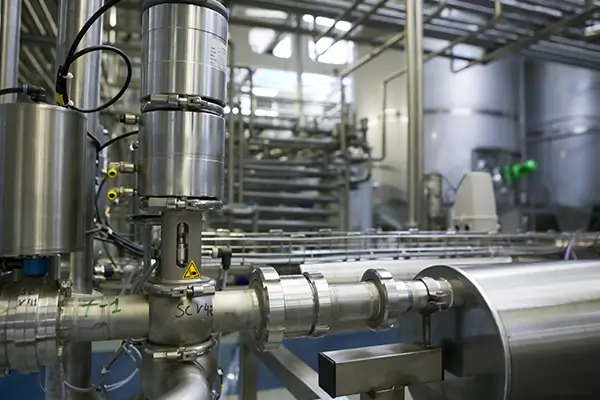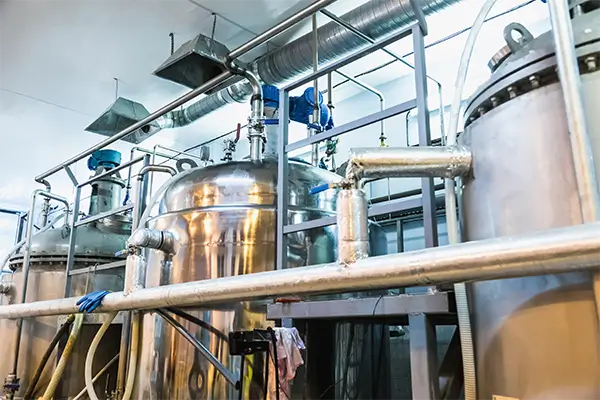At DeJong Consulting, we’re passionate about designing and building cutting-edge food processing facilities that exceed our clients’ expectations. Our expertise has been called upon by some of the biggest names in the American food industry, and we’re proud to have delivered innovative solutions that have helped them stay ahead of the competition.
What sets us apart is our deep experience across various business silos. We’ve worked with clients from different sectors of the food and beverage industry, and we’ve been able to draw on the best practices from each of these sectors to create facilities that are both efficient and effective.
Our team of experts is committed to delivering exceptional results on every project we undertake. We work closely with our clients to understand their unique needs and develop customized solutions that meet those needs. From concept to completion, we’re with our clients every step of the way to ensure that their projects are delivered on time, on budget, and to the highest quality standards.
If you’re looking for a partner who can help you design and build a state-of-the-art food processing facility, look no further than DeJong Consulting.
Contact us today to learn more about how we can help you achieve your goals.
Our solutions include process consulting, plant design, project management, and equipment installation to support:
DeJong is the company you need when food safety, profit margins, product innovation, and production rates are of utmost importance.
We have an in-house approach that makes it easy for you to keep track of your project’s progress. We provide you with a single point of accountability, so you can get answers to any questions you have with just a simple phone call throughout the entire build cycle.
Our experienced and nationwide team allows us to handle any type of project, big or small. We can offer our expertise in project management for your planned development, or take on the entire project from start to finish, including full food plant engineering. We are committed to helping you reach your goals, regardless of the size of your project.
We will work closely with you to identify process efficiencies and equipment improvements that can help take your plant to the next level. Through our efforts, you’ll see an increase in your return on investment (ROI), an improvement in plant production, and a reduction in the amount of waste you produce.
We put clients first—no side deals with equipment vendors, no pushing products you don’t need. We believe in honest, creative problem-solving to help you succeed.
We strive to bring creative thinking and cross-industry experience to the table as we work to solve customers’ process and plant operations challenges. There is no challenge too complex for our team to solve and no business too big or small for us to partner with.
At DeJong Operations Management & Consulting LLC, we recognize the challenges faced by food manufacturers. From intricate processes like separating egg membranes to ensuring seamless transportation of raw materials, every aspect of a food construction project demands meticulous attention.
Our expertise spans a diverse range of projects, from small-scale retrofits to comprehensive facility constructions. With years of experience under our belt, we are able to anticipate potential roadblocks and devise effective solutions to keep your project on track and your supply chain operational.
Whether you are expanding a production facility, enhancing cold storage capacity, or adding a new plant location, our design and construction services can provide insight into meeting food safety regulations and keeping your food-beverage industry project on track.

When considering refurbishment versus green-field construction, several factors come into play. While refurbishment projects may seem cost-effective and quicker, they often entail uncertainties and space inefficiencies.
On the other hand, green-field builds offer greater flexibility in design and layout optimization. However, one of the biggest considerations is the site location itself, especially when it comes to supply chain logistics.
As part of our consulting services, we conduct thorough evaluations of existing structures and potential build sites. We are also often involved in discussions with municipal and state agencies to address regulatory and planning considerations.
In the end, both potential build processes offer situational benefits and drawbacks. With our guidance, you can confidently select the optimal approach for your business, whether it’s a green-field build or a refurbishment project.
The cornerstone of any food plant construction is adherence to stringent hygiene and regulatory standards. Our best practices encompass a holistic approach to sanitary construction, ensuring the safety and quality of food products while prioritizing efficiency and sustainability.
From compliance with FDA regulations to the implementation of Hazard Analysis and Critical Control Points (HACCP) and Good Manufacturing Practices (GMP) principles, our design solutions are meticulously crafted to mitigate food safety hazards and promote hygienic practices.
Key considerations include zoning and layout optimization, utilization of hygienic materials, efficient drainage systems, and seamless wall-floor and wall-ceiling joints to prevent contamination.
Moreover, our designs integrate state-of-the-art ventilation, lighting, and pest control systems to maintain pristine processing environments. With a focus on employee training and waste management, we uphold the highest standards of cleanliness and sustainability.


In an ever-evolving industry, innovation is key to staying ahead of the curve. At DeJong Consulting, we leverage cutting-edge technologies and sustainable practices to optimize food plant construction and design. From efficient cleaning systems to eco-friendly solutions, our approach is rooted in maximizing operational efficiency while minimizing environmental impact.
By adhering to these best practices and embracing innovation, DeJong Consulting ensures that your food plant construction project not only meets regulatory requirements but also sets the stage for long-term success in the competitive food processing landscape.
At DeJong Consulting, we are dedicated to addressing the complex challenges of beverage sanitation with innovative solutions and industry expertise. By combining cutting-edge technology with rigorous sanitation protocols, we empower beverage plants to maintain the highest standards of hygiene, quality, and efficiency. No challenge is too complex for our team to tackle, and we remain committed to partnering with businesses of all sizes to achieve their sanitation goals.
Our team of specialists looks forward to working with you! Get a quote
DeJong Operations Management & Consulting LLC has a proven track record of helping clients from diverse industries maximize their return on investment and streamline their operations.